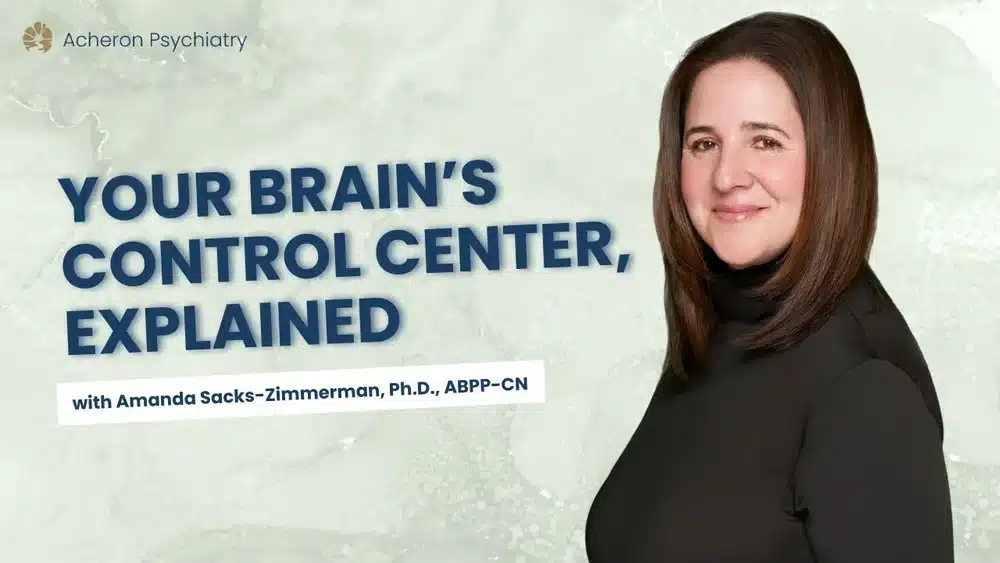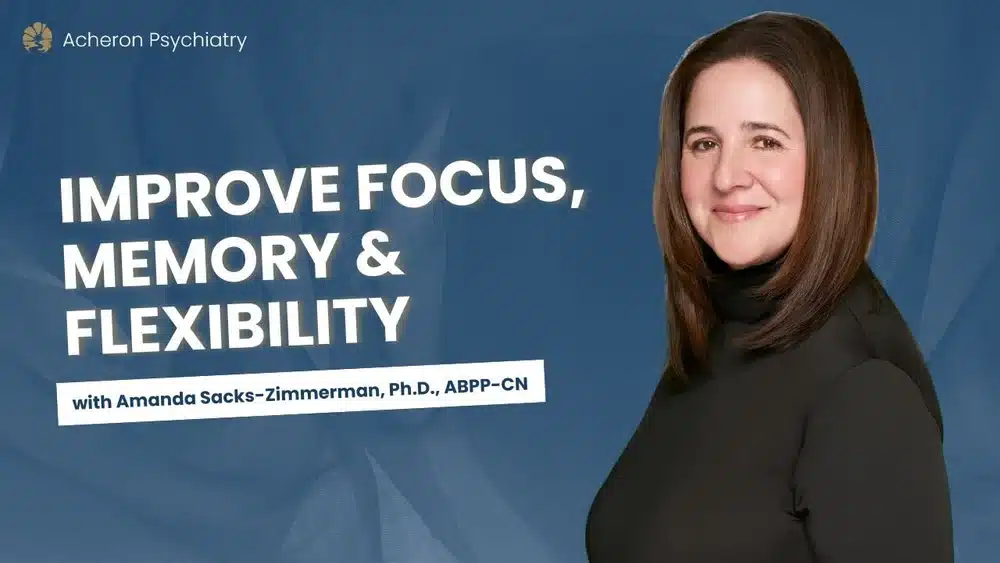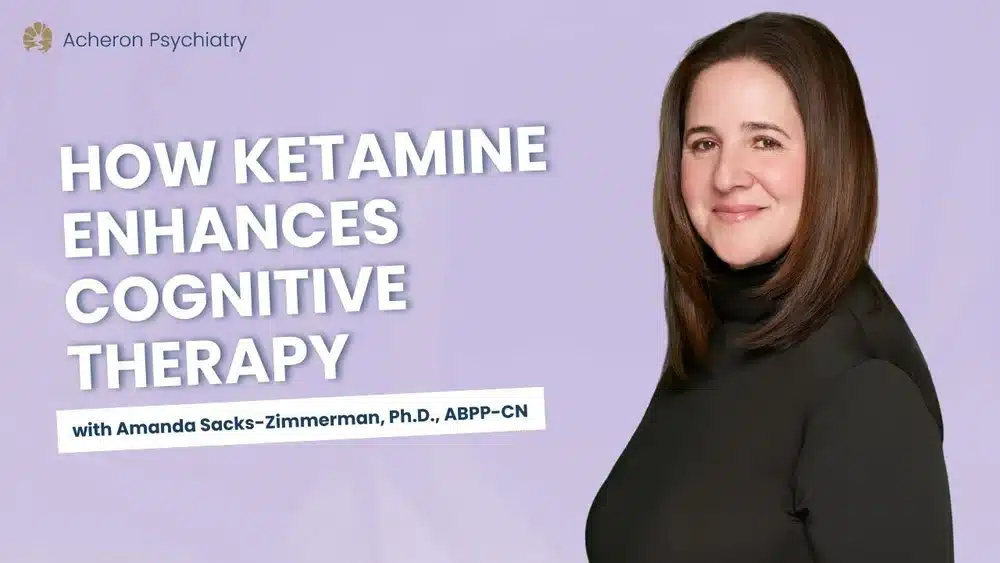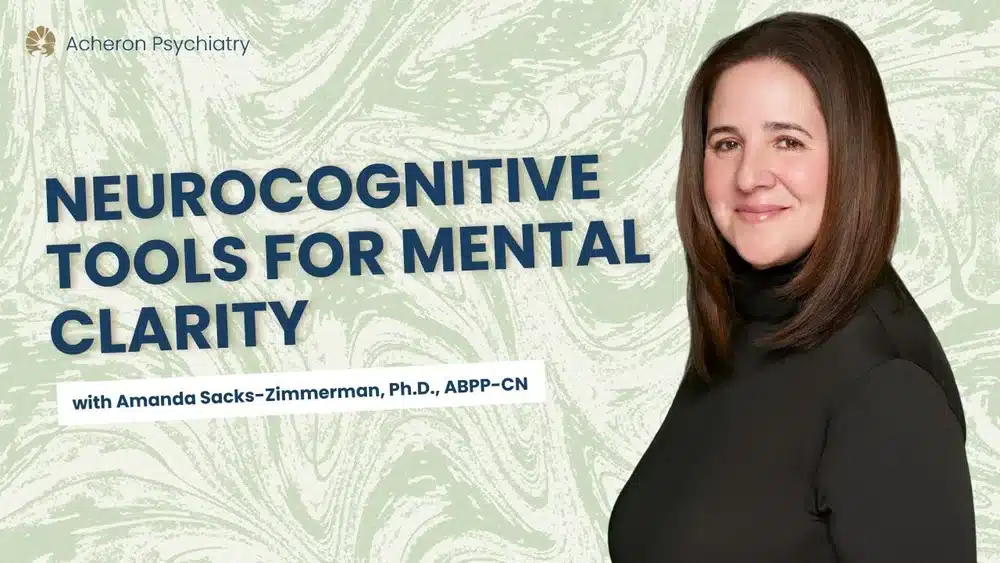Acheron Webinar and Video Guides
Explore past webinars from Acheron Psychiatry, covering topics like Ketamine-Assisted Psychotherapy (KAP), trauma healing, neurocognitive care, and integrative mental health.
This Month’s Featured Webinar:
Sacred Healing: KAP Webinar
This webinar offers an in-depth exploration of how KAP supports emotional processing, neuroplasticity, and trauma resolution. Grounded in neuroscience, trauma-informed therapy, and lived experience, this session invites clinicians, seekers, and healing professionals to reimagine healing not as symptom relief – but as deep transformation through safe, intentional, and supported ketamine work.
Why Acheron Ketamine Therapy?

Your Brain’s Control Center, Explained
Dr. Amanda Sacks-Zimmerman, Ph.D., ABPP-CN, breaks down the interconnected systems that govern attention, memory, and executive functioning. Learn how disruptions in these core cognitive functions can impact daily life—and how evidence-based interventions like Cognitive Remediation Therapy (CRT) can help. Whether you’re navigating ADHD, brain fog, post-COVID cognitive symptoms, or general mental overload, this video offers a foundational understanding of how your brain works—and how to support it.

Improve Focus, Memory & Flexibility
Dr. Amanda Sacks-Zimmerman, Ph.D., ABPP-CN, dives into the goals, structure, and strategies of Cognitive Remediation Therapy (CRT). Learn how CRT helps rebuild cognitive skills like attention, memory, and mental flexibility—and why it’s effective for conditions like ADHD, long COVID, post-concussion syndrome, and executive dysfunction. Whether you’re a clinician, a patient, or simply curious about how to strengthen your brain’s core systems, this video provides a practical and research-informed introduction to CRT.

How Ketamine Enhances Cognitive Therapy
Dr. Amanda Sacks-Zimmerman, Ph.D., ABPP-CN, introduces Ketamine-Assisted Cognitive Remediation Therapy (CRT-K)—a groundbreaking integration of neuroscience and psychedelic-assisted care. Discover how low-dose ketamine can enhance insight, boost neuroplasticity, and deepen the effectiveness of cognitive therapy for individuals facing ADHD, brain fog, executive dysfunction, and more. If you’re curious about the intersection of cognitive science and psychedelic healing, this video offers a compelling and accessible look into how CRT-K can support both clinical goals and personal growth.

Neurocognitive Tools for Mental Clarity: CRT & CRT-K Breakdown
In this clip from our Neurocognitive Webinar, Dr. Amanda Sacks-Zimmerman, a board-certified neuropsychologist and Clinical Director of Acheron’s Neurocognitive Services, introduces Cognitive Remediation Therapy (CRT) and Ketamine-Assisted Cognitive Remediation (CRT-K). Learn how these innovative treatments help improve focus, memory, decision-making, and emotional regulation—especially for individuals navigating depression, anxiety, ADHD, and trauma. Dr. Sacks-Zimmerman breaks down how CRT supports neuroplasticity through metacognitive and attentional strategies, and how CRT-K can deepen insight and accelerate change when paired with ketamine in a safe, therapeutic setting.
Ketamine-Assisted Psychotherapy Video Guides
Meet the Medicine
What is KAP—and could it be right for you?
In this video, psychiatrist Daniel Zimmerman, M.D., and psychotherapist Alessandra Licul, LMHC, introduce Acheron Psychiatry’s Ketamine-Assisted Psychotherapy (KAP) program, a legal, evidence-based treatment designed to help those struggling with depression, anxiety, PTSD, and more.
Whether traditional therapy hasn’t worked well for you, medications have fallen short, or you’re simply feeling stuck—KAP offers a new way forward. Ketamine supports perspective shifts, deeper therapeutic access, and emotional reset by quieting the brain’s default mode network and promoting neuroplasticity. The result? More impactful sessions, increased self-awareness, and renewed connection to yourself and others.
The Neuroscience of KAP
What actually happens in the brain during Ketamine-Assisted Psychotherapy (KAP)?
In this video, psychiatrist and Acheron founder Daniel Zimmerman, M.D., breaks down the neuroscience behind KAP—explaining how ketamine quiets the default mode network, reduces ego-driven thinking, and promotes neuroplasticity. This temporary ego-dissolution allows for a “blooming” of mental states, fresh perspectives, and enhanced emotional learning.
As the brain forms new, more integrated connections, KAP opens the door for insight, healing, and meaningful change. But the medicine is only part of the process—ongoing integration with your therapist is what helps those changes take root.
The KAP Experience
What is Ketamine-Assisted Psychotherapy (KAP), and how does it work?
In this video, therapist Alessandra Licul, LMHC, walks you through the three key phases of KAP at Acheron Psychiatry: preparation, the ketamine experience, and integration. You’ll learn how we tailor treatment to the individual, creating a safe and intentional space grounded in trust, collaboration, and care.
From setting the stage with preparation sessions to understanding how ketamine affects the brain—including its impact on the default mode network and neuroplasticity—Alessandra explains how this powerful treatment can offer new perspectives, emotional relief, and meaningful transformation.
